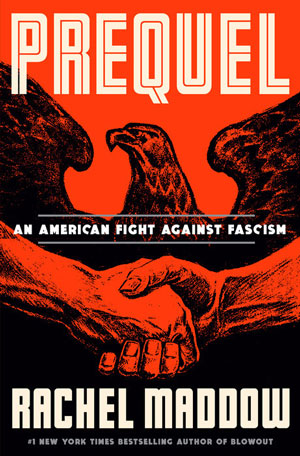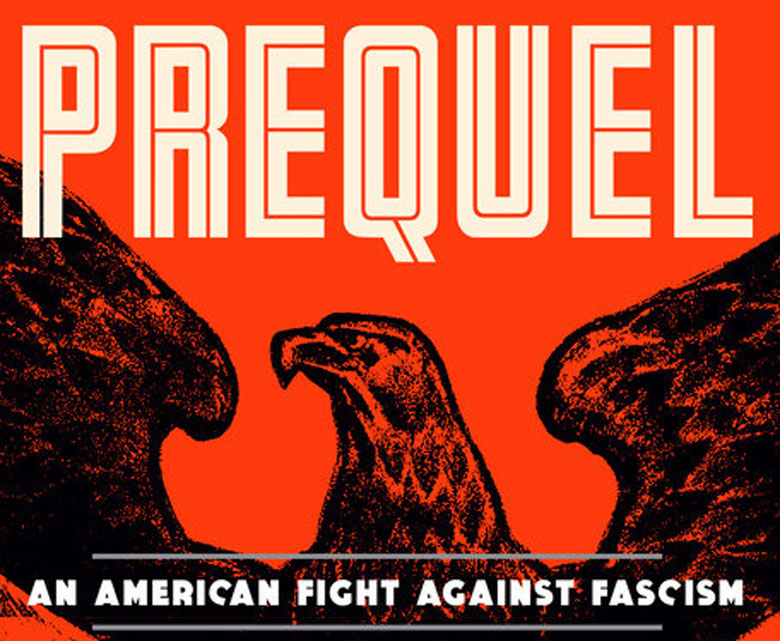Prequel: An American Fight Against Fascism
By Rachel Maddow; Crown (2023)
When the Maine Legislature recently debated a bill to tighten restrictions on paramilitary activities, the opponents squared off along predictable lines.
The backers cited concerns over the foray into Maine of Christopher Pohlhaus, a member of a neo-Nazi group who purchased land in Springfield intending to establish a fascist ethnostate. Pohlhaus sold the land a few months later, apparently in response to public pressure.
But the fact that a neo-Nazi enterprise might legally plant itself here spooked people, thus the proposed law, LD 2130, to make such projects more difficult. Most Democratic lawmakers voted for it.
The Nazi government had clandestine communications with many American Nazi groups, providing cash and propaganda…
All Republican lawmakers present voted against it. They cited concerns over possible infringements on First and Second Amendment rights. House minority leader Billy Bob Faulkingham called the proposal a “knee-jerk reaction to a handful of Nazis.” In other words, Pohlhaus and his followers constituted no serious threat to law and order.

If you were to read Rachel Maddow’s new book Prequel, you would quickly discover Faulkingham’s dismissal of Pohlhaus directly echoes how Nazi movements were regarded in America in the 1930s. The authorities, including FBI Director J. Edgar Hoover and the American news media viewed supporters of Hitler and Mussolini as, in general, a small number of crackpots whose makeshift political gatherings posed no problems worth paying attention to. The real threat, for them, was communists.
But Maddow shows in ping-ponging historical detail that Nazi supporters were better organized, in many cases better equipped, and in most cases more numerous than was popularly—or officially—believed.
American Nazi organizations formed around ideas outlined by Henry Ford and Adolf Hitler (who praised Ford’s antisemitic writings) involving the dangers of Jews and communists to ethnic, social, civic, and religious order. Pro-Nazi organizers included William Dudley Pelley, leader of the Silver Shirts, who thought of himself as an American Hitler.
George Deatherage, who proudly explained to the congressional Dies Committee on Un-American Activity that he and his followers in the American Nationalist Confederation were responding to a national emergency with the goal of “salvation of the world for Christian and Aryan people.”
Retired Maj. Gen. George Van Horn, convinced that Jews and communists were conspiring to dominate the world, was the leadership hope for many groups intent on overthrowing the government. Father Charles Coughlin reached tens of thousands of followers through huge rallies and his radio ministry, preaching the deadly dangers of Jews, communists, and President Franklin Delano Roosevelt.
Active groups included the German American Bund, which ran summer camps modeled after the Hitler Youth camps. The Friends of New Germany in Los Angeles had links inside the U.S. military from whom they arranged to buy weapons. The Christian Front planned bombings to touch off riots which, they hoped, would destabilize civil order and provide an opening for an armed takeover of the government. The American White Guard’s Henry Allen made detailed plans to massacre Jews in Southern California.
The Nazi government in Germany had clandestine communications with many American Nazi groups, providing cash and propaganda, much of which came through the offices of U.S. congressmen and senators.
All this was curbed only when investigative journalists, such as Eric Sevareid, and citizen spies compiled information on Nazi groups and alerted the public and authorities.
The book’s title invites us to think of these events and people as the historical origin of fascist threats in the U.S. today. If you already agree with Maddow that such threats exist, then Prequel provides a welter of eye-opening parallels in which the Jan. 6 insurrection, the Charlottesville rally of 2017, Gen. Michael Flynn’s calls for a Christian nationalist government, the defense of Vladimir Putin, and the ambitions of Christopher Pohlhaus make complete historical sense.
But how all this threaded from the 1940s to the 2020s, Maddow does not explain. Only a few paragraphs at the very end of the book mention the present-day specter of authoritarianism. You have to already agree with the point of this flawed book to get it.
Beyond the unorthodox clumsiness of its source citations, the narrative is seriously marred by its aggressive informality, especially the same sarcastic, often childishly snotty voice that Maddow projects on television. Her offensive self-righteousness probably precludes Prequel from being read by legislators, or other thoughtful conservatives, who might otherwise change their minds about restrictions on neo-Nazi militias.
The most dangerous people in the world are the ones who are certain they know the moral truth.
Dana Wilde is a former editor and college professor and writes the Backyard Naturalist and Off Radar columns for the Central Maine Newspapers. He lives in Troy.





